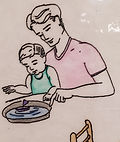
"All that we ourselves are has been made by the child,
by the child we were in the first two years of our lives."
Maria Montessori
The Prepared Environment
Research shows the most crucial time in a child’s development is within the first three years of life. A child changes drastically in this time. In the first several months, he must rely solely on a caregiver to meet his needs. By age three, his independence and growth is evident in his ability to walk, speak, perform tasks and think for himself.
Throughout this first period of life, the child’s brain is like a sponge that unconsciously absorbs everything around him, including language, movement, interactions and experiences. What the child absorbs from his environment helps shape the person he will ultimately become. This is why Dr. Maria Montessori emphasized the importance of creating an optimal environment for the child at each stage of development in her teachings.
Montessori educators are trained to leverage their knowledge that the child uses the people and objects in his environment to construct himself. At Sprout, a considerable amount of thought, planning and reflection is involved in the process of preparing an environment that will best serve the child and meet his needs at each stage of development.
The following are fundamental components of Montessori Infant and Toddler Classrooms.

Language Development
The first three years are the most sensitive time in our development for acquiring language and learning to communicate. The more language in, the more language out. Montessori classrooms are rich with language experiences, and children are exposed to sounds and speech continuously throughout the day.

Practical Life
Practical life activities teach children how to take care of themselves, each other and their environment. In addition to teaching the child a practical skill and awareness of community, practical life activities help the child gain functional independence, develop his will, increase his intellect and foster his self-confidence.
"I can do it!"

Gross Motor Development
From learning to roll over, sit, crawl, pulling to stand and walk, Montessori classrooms are container-free to give the child the freedom to develop and refine his equilibrium.

Psycho-Sensory
Filled with materials that appeal to the visual, tactile and auditory senses, the classroom enables the child to gain the experience necessary to develop and refine his senses.

Grace and Courtesy
In the early stages of life, the child doesn't yet comprehend why we do things, but he does mimic our actions. Grace and courtesy are modeled in Montessori classrooms from the beginning. We listen to each other and do not interrupt. We create a loving environment with unconditional acceptance.

Music
Music is a universal language that exists across all cultures. Not only is it enjoyable to listen to, it exposes the child to new movements and spoken language.

Art
. In the classroom, art is available on the shelf every day so the child can choose this as a self-directed activity. Art in the Montessori classroom is process-focused where no emphasis is placed on creating a specific product. This allows the child to explore his creativity and experiment with different art materials.

Toilet Learning
Montessori educators are trained to apply a pressure-free approach to assist children working to acquire this new skill. Trained teachers understand that toilet training is a process, and that the child needs patience, understanding, routine and consistency in this endeavor.

The Adult
Montessori educators recognize that the child's work every day, much like the tasks of our jobs, is to grow, develop and become more independent. In the classroom, the duty of adults is to recognize and remove obstacles to the child's development while offering the best version of themselves as an example.